Press releases
-
12/05/2023We install first offshore wind turbine at Saint-Brieuc project The first wind turbine in the sea of Brittany The installation of the first of 62 wind turbines equipping the Saint-Brieuc wind farm was carried out on May 12 by Siemens Gamesa Renewable Energy, contractor of Iberdrola. This operation was carried out from the jack-up vessel Brave Tern of the Norwegian company Fred Olsen windcarrier. The first wind turbine of the Saint-Brieuc wind farm was installed on position number SB44, located on the northern part of the site. Thanks to this, Brittany acquires its first offshore wind turbine. "The successful installation of the first offshore wind turbine at the Saint-Brieuc wind farm represents a great milestone for Brittany and for the project. It means that we are entering the final stretch of the project, which will lead to the massive production of renewable and carbon-free energy for Bretons. After more than a decade of efforts and commitment from the Brittany region, local stakeholders and Iberdrola teams, this first wind turbine manufactured in Le Havre and equipped in Brest is also the culmination of a great industrial adventure, of which we can all be very proud." says Emmanuel Rollin, Managing Director of Iberdrola France. Starting point for the installation phase of 62 wind turbines The installation phase of 62 wind turbines has now begun. This starting point is decisive as it is emblematic of the last phase of the farm’s construction. The installation vessel Brave Tern will carry out several iterations in the coming months from Le Havre, each time with the constituent elements of 4 wind turbines on board. The wind turbines of the Saint-Brieuc wind farm are being manufactured in France, on the industrial site of Siemens Gamesa Renewable Energy, located on the port of Le Havre. On this dedicated site, about 900 jobs have been mobilized for their fabrication and assembly. The towers of the 62 wind turbines were previously equipped by the company Haizea Wind on the Brest polder. This new industrial activity continues to mobilize about forty on-site jobs for the mechanical and electrical assembly of all the internal elements. A multi-stage installation At sea, the 90-meter-high tower of the wind turbine is first raised from the barge and then lowered by crane onto the transition piece of the jacket foundation, before being fixed. In a second step, the nacelle is lifted and installed on the tower. Finally, the 3 blades are fixed to the rotor. The structure installed at sea has 209 meters at the tip of the blade and the rotor is 167 meters in diameter. It is designed to best respond to the wind regime that characterizes the bay of Saint-Brieuc. For the first wind turbine, these operations were successfully carried out by the Brave Tern, a vessel specializing in the installation of offshore wind turbines. For each iteration from Le Havre to the site of the Saint-Brieuc wind farm, the Brave Tern embarks 4 towers, 4 nacelles and 12 blades. Key figures for the Baie de Saint-Brieuc offshore wind project: - 75 km² area - 62 Siemens Gamesa SG 8.0-167 DD wind turbines of 8 MW unit capacity - 496 MW of installed capacity - 1,820 GWh/year of production, amounting to the annual electricity consumption of 835,000 inhabitants (including heating) READ MORE
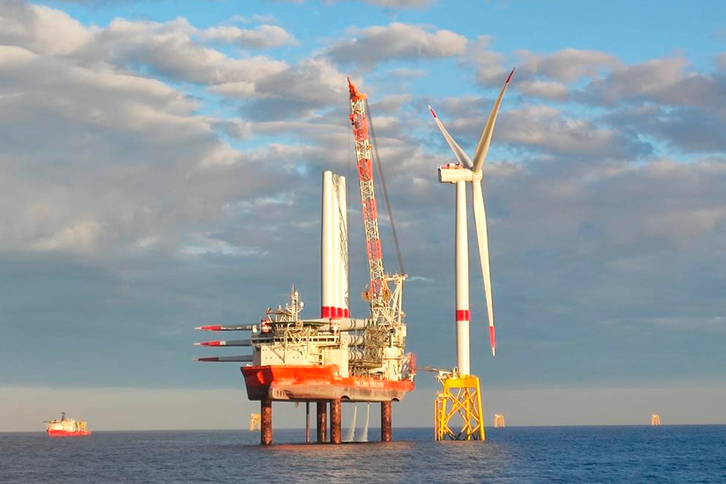
-
09/05/2023More Europe, by Ignacio S. Galán For my generation, being pro-European was the credible promise of a clear path to a consolidated democracy and a market economy oriented towards the social welfare of all Spaniards. We believed that opening up to the outside world and to modernity would allow Spain to attain its rightful place on the continent and in the world. How many times I have discussed this with my dear Manuel Marín, a great Spaniard and a great European. Today I still firmly believe that this "European-style" model, which transcends any false antagonism between competitiveness and solidarity, is also the answer to the new and serious challenges facing us. The European Union must no longer seek, as it did eighty years ago, to arbitrate mechanisms of balance and concord among its members, but to establish a common framework that will enable it, like the Spain of the eighties, to play the global role it deserves. Like many of the prestigious personalities who sign these articles, all admired and some great friends, I have been a privileged witness of how the hopes we placed in the construction of the Community became a reality for Spain and also for the rest of Europe. Some opportunities crystallised as we had hoped, and others were frustrated or fell by the wayside, but I believe that the reason was never the Europeanist project, but rather its insufficient progress. At the time of the fall of the Berlin Wall, I was working in the German town of Soest, managing an industrial plant. Overnight, a consolidated and prosperous country set itself the goal of reunification, but how to deal with the convergence of such disparate realities without undermining the common project of a new Federal Republic? Apart from the great merit of the Germans' planning and execution, one of the secrets of their success was that the issue was never seen merely as a national problem, but as an opportunity for the entire continent. And European society rose to the occasion: German reunification went hand in hand with the Maastricht Treaty and a period of great progress towards integration. Returning to Spain, who can deny the political, economic and social transformation that the country has undergone in recent decades as a result of its integration into the European Union? I also experienced it first-hand in the Basque Country, when a group of politicians, businessmen and leaders of other civil society institutions decisively tackled an industrial reconversion that was essential and which always had a European horizon. As a result of negotiation, generosity and the courage of everyone, all obstacles were overcome: the Bilbao we know today is a good symbol of the success of this transformation. In short, European integration has been a key factor in our political, economic and social progress. It is an imperfect project, always unfinished, but if we look at it with a historical perspective, its value is clear. I do not claim to provide definitive answers, but I do want to share a conviction. Today's problems are not yesterday's, but the solution remains the same: more Europe. In 1988, the Italian economist Cecchini wrote that well-known report on the "cost of non-Europe", giving rise to an exercise that is still essential to carry out on a regular basis: how would we have dealt with the pandemic or the war in Ukraine without a united Europe? Once again, crises have also been opportunities for structural progress: the management of vaccines, European recovery funds, the united response to the situation in Ukraine... Few doubt that, at these crossroads, fragmentation would have led to failure. But we should not be under any illusion: if the Union shows us the way out in times of crisis - which hopefully will be short-lived - it is because it also makes us stronger on a permanent basis. That is the great lesson we must learn. That is why we must also look to Europe for the solution to those other structural problems which, unfortunately, will not disappear through a one-off exercise of courage. A clear example of this is the response to the great challenge before us, climate change. If we want to turn our weaknesses into strengths, we must free ourselves from dependence on fossil fuels, whose volatility and geopolitical implications we are suffering in environmental and strategic terms. And we have the solution. We are even creating it in Europe and exporting it worldwide thanks to research, the commitment of some and the commitment of many companies of all sizes. Electrification offers us the path to decarbonisation , energy independence , the balancing of our external balance and the consolidation of a competitive green industry that generates quality employment. Those of us who started down this path more than 20 years ago, because we believed that the energy transition was not only an economic opportunity but also a moral obligation, are enthusiastic that this winning bet is now in the majority. But we must accelerate decisively to take advantage of it. For this and for many other reasons, business and citizens must engage wholeheartedly in the European project, not as mere believers in an unalterable truth, but to continue to shape it and explore all its virtues. My experience is that many are already doing so at various levels. For years I have been very active in the European Roundtable for Industry, which brings together the major European industrial companies. For some time now, I have been observing the commitment of those of us who make up the Roundtable to be part of the solution, directing our activity and our investments towards areas that promote competitiveness, decarbonisation and the social well-being of Europeans. And for this, national routes are never favoured, however fast they may seem. We all know that only a strong and complete Internal Market will allow us to compete in an increasingly integrated world. And for this, we need common and stable European policies, tax harmonisation and speeding up of administrative procedures. Throughout these pages, the reader will see that the visions of Europe are not uniform. Each author takes his or her own approach, based on personal and professional experience, but there is a common thread running through them all: the profound conviction that Europe is also a stake in the future. The Union is above all a vanguard of political, economic and social organisation, which is why its final chapter has never been written. We face new problems, it is true, but we have the formula that has given us the greatest period of peace and prosperity in our history: more Europe. Let us continue to explore it and to reshape it. READ MORE
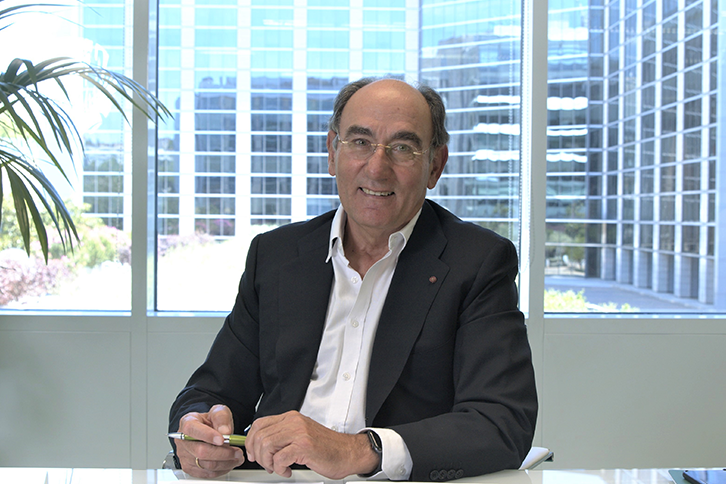
-
29/04/2023We launch our International Graduate Programme 2023 for the recruitment and training of young talents Iberdrola launches its International Graduate Programme 2023 with the aim of attracting and incorporating young talent and anticipating future needs arising from its recently communicated ambitious growth and investment plan. This initiative is aimed at recent graduates or people with less than two years of experience. Those selected to join the company will have a two-year training plan that includes rotations in different areas and businesses of Iberdrola and at least a six-month international assignment at the group's headquarters around the world. In this 2023 edition, the company offers around 300 vacancies in positions mainly related to engineering, big data, data analytics and cybersecurity, in addition to other degrees such as Business Administration and Management, Economics and Law, Mathematics or Physics and Chemistry. Through its International Graduate Programme, the group will be able to anticipate its growth needs and guarantee its coverage with the best talent. In this way, the company is committed to training the specialists and leaders of the future in view of the shortage of STEM (science, technology, engineering and mathematics) professionals expected in the coming years. In this decade, the demand for profiles in these disciplines is expected to increase by up to 14% in Europe and 24% in the United States. For the selection of candidates, in addition to their academic record and language skills, other factors will be taken into account, such as their willingness to work in different countries, including Australia, the USA, Ireland, Mexico and Brazil, and their interest in developing in different areas of knowledge. Interested applicants can consult all the conditions and finde all vacancies available for the International Graduate Programme on the website www.iberdrola.com. This third edition of the Iberdrola group's International Graduate Programme is part of the company's commitment to young talent and equal opportunities in the countries where it operates. In addition to completing their training, those selected will have the opportunity to develop their career in a global energy leader in renewable energies, key to the energy transition and decarbonisation. The creation of quality employment is a strategic pillar of the company's social commitment, which plans to hire close to 11,000 new employees in the group until 2025. In the last year alone, the company has hired more than 5,600 people, 36% of them under 30 years of age. This commitment to human capital is the result of the company's investment efforts and growth plans, with investments of €47 billion up to 2025, with which it will double its renewable capacity and advance in smart grids and the electrification of the economy. READ MORE
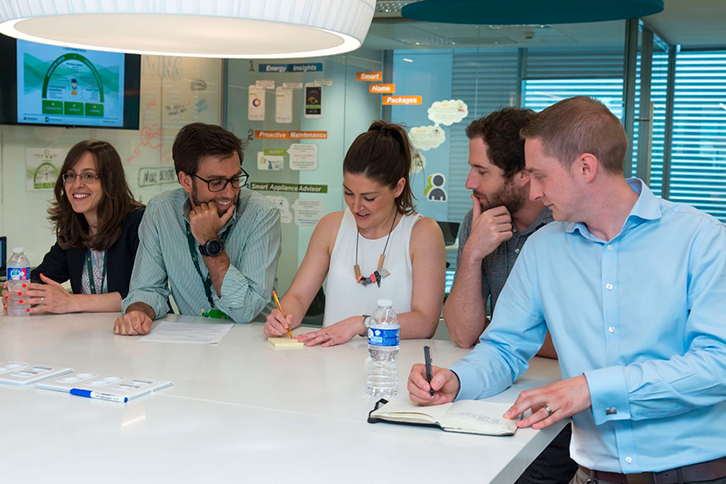
-
28/04/2023Massive support from our shareholders for the company's management in a record year Iberdrola’s shareholders have resoundingly approved all resolutions on the agenda at the company’s annual shareholders meeting in Bilbao, with an average affirmative vote of more than 98% across all 22 items in the agenda , which covered results, dividends and corporate management; corporate governance and sustainability; remuneration; and the appointment and re-election of directors. The Iberdrola’s Annual General Meeting of Shareholders , held at the Torre Iberdrola in Bilbao today, has registered a quorum of 72%. During the meeting, shareholders have been informed on the relevant position of the company, which today is the largest European utility and one of the two largest in the world by market capitalization, with more than €76 billion. The company has grown from the 20th largest in the world two decades ago. In this time Iberdrola’s share price has increased in value from 3.5 euros to 11.8 euros, with an additional 6.5 euros per share distributed in dividends. Galán referred to the 2022 Iberdrola’s record year of investment, financial strength, international expansion and results, as well as social contribution, employment and emissions reduction. During 2022, Iberdrola invested €11 billion to build more clean energy, smarter grids and storage. Net profit reached a record €4.34 billion, and financial solidity was enhanced by strong operating cash flow and FFO / Adjusted Net Debt ratios. The company’s international footprint contributed to reaching 40,000 MW of installed renewables capacity, with new projects in Asia Pacific, the EU, US and UK, and 1.2 million of km of transmission and distribution networks. The year also saw a record of €17.8 billion purchases, supporting suppliers who employ more than 400,000 people across the world. Global Tax contribution reached €7.5 billion in countries where Iberdrola operates, and Iberdrola made 4,700 new hires, making 2022 a record year for job creation and economic activity. Clean energy investments allowed the company to register a record reduction in emissions, to only 59 gCO2/kWh in Europe, ¼ of EU average. On top of all this, more than 20 million euros was committed by the company's foundations, to support education, skills, and social initiatives. Speaking at the meeting, Ignacio Galán, said: “The Iberdrola we present here today is a more solid, sustainable and diversified company than ever, allowing the Board of Directors to propose to this General Shareholders' Meeting a record shareholder remuneration, of €0.49 per share, with an increase of more than 10 per cent.” Iberdrola is currently accelerating the delivery of its 2023 to 2025 business plan, which will see an investment of €47 billion worldwide. Already 60% of planned additional renewables capacity of 12,000 MW is under construction or secured and all of the electricity networks investments are part of frameworks already agreed or in advanced negotiation. The company’s asset rotation and partnership targets are also now 100% achieved, improving financial strength and accelerating investments: this includes an agreement to sell 60% of Iberdrola’s business in Mexico for $6 billion and scaling up co-investment partnerships with GIC to co-invest in transmission in Brazil , and Norges Bank to develop new renewables. Mr Galán said: “By 2025 we will deliver 12,000 new hires and continue making our workforce a benchmark for equality, diversity and inclusion. Our purchases, that will reach 50 billion euros over the next three years, will create even more employment opportunities at our thousands of suppliers and will generate billions in tax contributions in addition to the more than 20 billion euros we expect to contribute”. More information on the Shareholders Meeting can be seen here: https://www.iberdrola.com/corporate-governance/general-shareholders-meeting/documents READ MORE
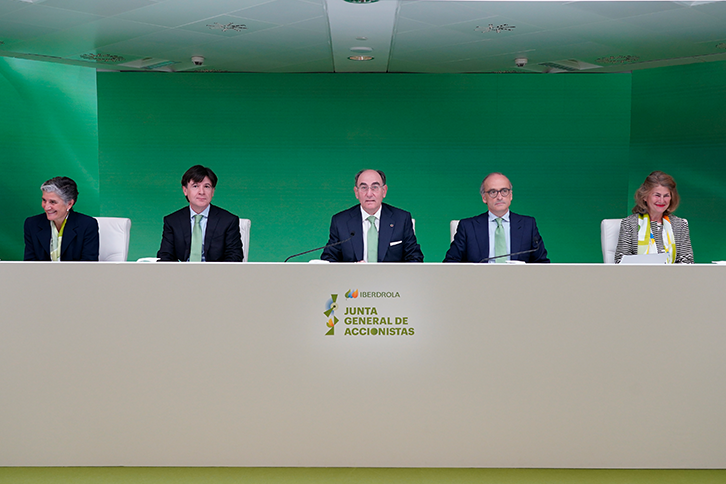
-
27/04/2023Ignacio S. Galán holds a meeting with the Mayor of Bilbao, Juan Mª Aburto Ignacio S. Galán has held a meeting with the Mayor of Bilbao, Juan Mª Aburto. This meeting took place, as is traditional, on the eve of the General Shareholders' Meeting to be held tomorrow, April 28, in Bilbao, the company's headquarters. READ MORE
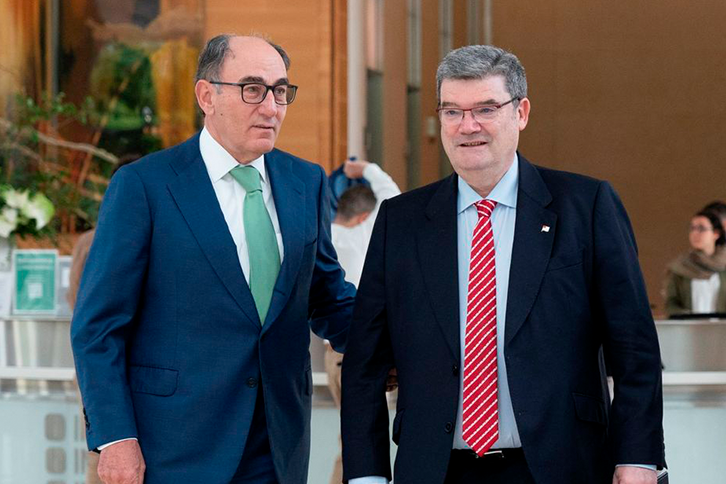
-
27/04/2023Avangrid's pachwáywit fields, Oregon's largest solar farm, achieves commercial operation AVANGRID (NYSE: AGR), a leading sustainable energy company and member of the Iberdrola Group, announced today that it has achieved commercial operation at its 162 MWac (205 MWdc) Pachwáywit Fields solar farm (also known as Montague Solar) in Gilliam County, Oregon, becoming the state’s largest photovoltaic plant. The facility will deliver clean, renewable energy to large customers and municipalities enrolled in Portland General Electric’s (PGE) Green Future Impact program , allowing them to meet their ambitious sustainability and carbon reduction goals. “This new solar project is proof of AVANGRID’s strong commitment to accelerating the energy transition in Oregon and in the U.S.,” said Pedro Azagra, AVANGRID CEO. “We are proud to work with PGE to help it meet its ambitious targets to reduce emissions and provide clean, reliable power to its customers.” “Pachwáywit Fields, the largest solar project in the state of Oregon, will provide clean energy to 17 of PGE’s largest customers through our Green Future Impact program” said Brett Greene, PGE Senior Director of Clean Energy Origination & Structuring. “We are proud to partner with our customers to deliver 162 MW of clean electricity toward our collective decarbonization goals at an affordable price, advancing the clean energy transition here in Oregon as outlined in our Clean Energy & Integrated Resource Plans.” “The completion of AVANGRID’s Pachwáywit Fields project is great news for Gilliam County. Thanks to AVANGRID for selecting Gilliam County for this project, we now house the largest solar project in Oregon and will be receiving a significant increase in tax revenue in the future. The project has also made Gilliam County the largest producer of combined wind and solar renewable energy in the State of Oregon. Because of the extended construction period, the county also realized additional and unanticipated tax revenue. Working with AVANGRID to arrive at this status has positioned Gilliam County with a larger voice in the State while we advocate for assistance in housing, daycare, broadband, arts and culture and other initiatives that are important to our residents as we navigate our way into the future”, said Pat W. Shannon, Gilliam County Commissioner. AVANGRID’s Pachwáywit Fields, which began construction in 2021, spans 1,223 acres and includes 471,156 solar panels that generate the electricity equivalent to powering 40,000 homes. During its construction, the facility created around 300 jobs and brought $1.37 million to the community through local taxes and property lease payments. Pronounced Patch-Why-Wit, this word means “sun” in the Sahaptin language. The project is located on ceded lands of the Confederated Tribes of the Warm Springs, and the name pays homage to the rich history and stewardship of the Warm Springs and Umatilla Tribes. READ MORE
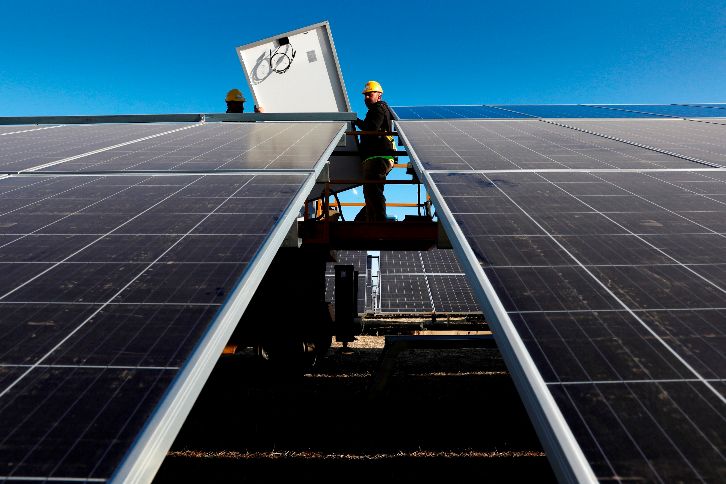
-
26/04/202310.4 billion investments boost our net profit to €1.485 billion Commenting on the results, Ignacio Galán, Executive Chairman of Iberdrola: "This has been a good start to the year for Iberdrola, reinforcing the strength of our business model as a global leader in the energy transition". “We are now seeing faster progress on energy policy and regulation, driven by green energy security in most of the countries where we operate. We are well positioned to support the acceleration of electrification in our key markets, and we remain fully committed to growing our business with more renewables, more networks and more storage in countries with ambitious targets and stable regulations.” READ MORE
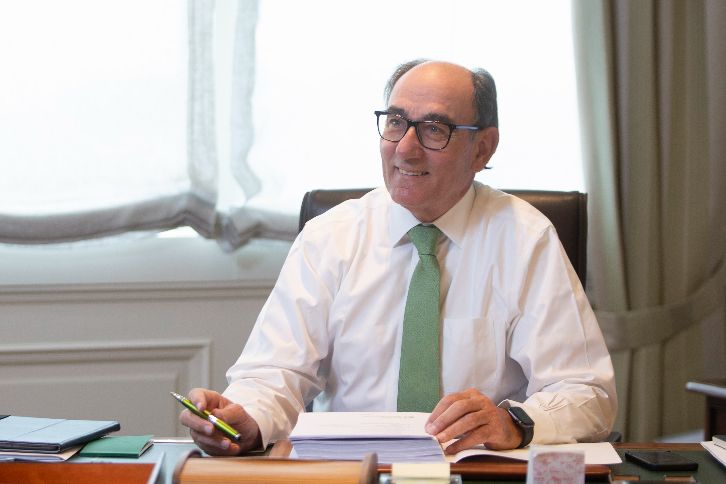
-
26/04/2023We seal a strategic alliance with GIC for the expansion of transmission networks in Brazil Iberdrola is making significant progress in its 2023-2025 Strategic Plan . The company has signed a strategic agreement with GIC, a leading institutional investors, for the development of transmission networks in Brazil for 2.4 billion Brazilian reais - 430 million euros – as communicated today to the National Securities Market Commission (CNMV). Both companies will co-invest in operational assets (Jalapão, Santa Luzia, Dourados, Atibaia, Biguaçu, Sobral, Narandiba and Río Formoso), which in total represents 1,865 km of transmission lines and annual profitability of 430 million Brazilian reais - about 77 million euros - with an average concession term of 25 years. Iberdrola, through its subsidiary in Brazil, will have a 50% stake in the company, valued at 1.2 billion Brazilian reais - 215 million euros. The operation was carried out at a multiple of 13 times the gross operating profit (Ebitda). In addition, the partners have signed a framework agreement for the joint participation in future tenders for electricity transmission assets in Brazil, including the auction scheduled for June 30, 2023. GIC becomes a preferred partner for assets under construction and upcoming auctions. The alliance includes the right to acquire a 50% stake in other assets under construction and operation (Itabapoana, Guanabara, Vale do Itajaí, Lagoa dos Patos, Morro do Chapéu, Estreito, Alto do Parnaíba, Paraíso and Potiguar Sul), which encompass 6,279 km. The total annual return on these assets is equivalent to approximately 1.3 billion Brazilian reais (about 233 million euros). Once the operation is executed, Iberdrola's subsidiary in Brazil, Neoenergia, will stop consolidating the debt of the operational assets, considered within the scope of the transaction. GIC is a leading global investment firm established in 1981 to secure Singapore's financial future. As the manager of Singapore's foreign reserves, GIC takes a long‐term, disciplined approach to investing, and is committed to investing in critical solutions to accelerate the energy transition. Partnering with a financial investor of the highest international reputation will allow Neoenergia to consolidate its firm commitment to growth in the transmission sector in Brazil. Iberdrola's asset rotation and partnerships to boost growth and decarbonisation This transaction is part of Iberdrola’s non-core asset rotation program, which is now 100% fulfilled, to support the company’s record investment plan of 47 billion euros. As part of its investment plan, approximately 27 billion euros will be allocated to electricity grids worldwide, increasing the value of the company's network assets to 56 billion euros over the next three years. In addition, some 17 billion euros will be allocated to the renewables business, in which it plans to increase its portfolio by more than 12,000 MW of renewable energy. In recent months, the energy group has closed several long-term alliances to promote the decarbonization of the economy: * Recently, Iberdrola has signed an agreement to sell more than 8,400 MW of combined cycle gas in Mexico for 6 billion dollars. * Last month, Iberdrola and MAPFRE advanced in their strategic alliance by incorporating 100 new MW through a joint venture, which already has 450 MW. * Iberdrola and bp also signed a strategic alliance in March to deploy 11,700 fast charging points in Spain and Portugal. * At the beginning of the year, Iberdrola and Norges Bank Investment Management signed an alliance to co-invest in 1,265 MW of new renewable capacity in Spain. * In addition, a few months ago Iberdrola signed an alliance with Energy Infrastructure Partners to co-invest in the Wikinger offshore wind farm and boost its offshore wind portfolio. Brazil, a country with great growth potential Iberdrola operates in Brazil through the subsidiary Neoenergia, a leading company in Brazilian networks with more than 710,000 kilometers of power lines. It controls five distributors in 18 states plus the federal district of the country and is a renewable energy giant, with 5. 200 megawatts of installed capacity, of which 90% are green. The Brazilian subsidiary of Iberdrola has already established itself as an energy benchmark in Brazil: it has a client portfolio of 16 million. The company, which has a workforce of more than 15,000 people and generates indirect jobs that represent more than 28,000 jobs. Neoenergia began operations in 1997, but took a giant leap in 2017, when it merged with Elektro, also owned by Iberdrola. Its debut on the Stock Exchange occurred through a Public Offering (IPO) on July 1, 2019 in the B3 segment of Novo Mercado of the Brazilian Stock Exchange. READ MORE









